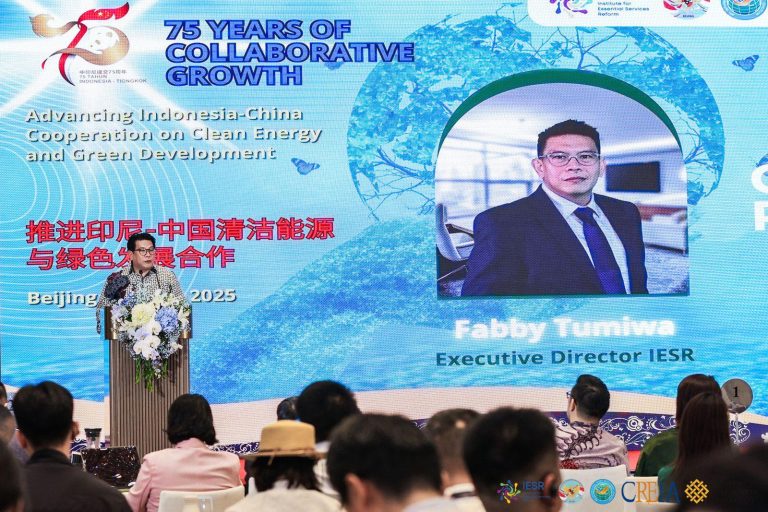Jakarta – Amid the 75th anniversary of diplomatic relations between Indonesia and China, the Institute for Essential Services Reform (IESR) emphasises the importance of strengthening the partnership between the two countries in accelerating the clean energy transition and tackling the global climate crisis.
This message emerged during the forum “High-Level Dialogue: Advancing Indonesia-China Cooperation on Clean Energy and Green Development” held in Beijing on Tuesday, 10 June, involving stakeholders from government, academia, and renewable energy industry players.
IESR Executive Director Fabby Tumiwa emphasised that Indonesia has tremendous renewable energy potential that has not been optimised. Based on IESR’s study, the total technical potential of renewable energy in Indonesia is estimated to exceed 7,700 gigawatts (GW), more than double the official figure released by the government. Among these clean energy sources, solar energy has the biggest capacity to become the backbone of decarbonising the electricity sector.
“Indonesia faces a double challenge: meeting the growing energy demand and promoting sustainable economic growth. Renewable energy, especially solar and wind, is capable of being the main solution, provided it is accompanied by the development of energy storage systems and modernisation of the electricity grid,” Fabby said.
He admitted that there are still many doubts about the reliability of solar and wind energy due to their intermittent nature. However, according to him, countries such as China, India and Australia have proven that these challenges can be overcome with technological advancements.
“Lithium-ion, sodium-ion, and solid-state battery technologies are now much more affordable and reliable. Even energy storage through pumped hydro and hydrogen is becoming more mature and economically viable,” he explained.
IESR sees strategic opportunities in building a solar energy industry ecosystem with China, including through the China-Indonesia Solar Partnership initiative. This initiative encompasses the development of the latest generation of solar panel technology, the electrification of the Indonesian archipelago through solar power plants and battery energy storage systems (BESS), and collaborative research on adapting solar technology to Indonesia’s tropical climate.
IESR also encourages the development of green financing for solar energy component manufacturing, partnerships in industrial sector decarbonisation projects, and cross-border carbon trading based on large-scale solar projects. “This collaboration will combine the strengths of China as a technology leader and Indonesia as a market and strategic location for green industry development. This is a golden opportunity for both countries,” Fabby said.
Deputy Chief Representative of Indonesia in Beijing, Parulian Silalahi, added that the clean energy transition is not only focused on reducing carbon emissions, but also presents opportunities for job creation and large-scale investments. He cited several investors who have entered, such as Trina Solar from China and SEG Solar from the United States, who are now building a solar panel factory in Central Java.
“China has a strategic role not only as a supplier, but also as a partner in the development of the renewable energy industry supply chain in Indonesia. If managed well, this cooperation can accelerate the energy transition, not only for Indonesia but also for Southeast Asia,” said Parulian.
A similar sentiment was expressed by Zhang Jianyu, the Executive Director of the BRI Green Development Institute, who highlighted that developing countries, such as Indonesia, are often the most affected by the climate crisis, despite not being the primary cause. Therefore, solidarity and collaboration between developing countries is important, especially in developing renewable energy technologies and solutions.
“Chinese companies such as JA Solar, Trina Solar, and Jinko Solar are ready to contribute more, whether through technology provision, skills transfer, or direct investment in partner countries such as Indonesia,” Zhang said. (Hartatik)
Banner photo: IESR Executive Director Fabby Tumiwa delivers a presentation at the forum “High-Level Dialogue: Advancing Indonesia-China Cooperation on Clean Energy and Green Development” in Beijing on Tuesday (June 10, 2025). (Source: IESR)















